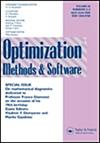Cheap Newton steps for optimal control problems: automatic differentiation and Pantoja's algorithm
IF 1.4
3区 数学
Q3 COMPUTER SCIENCE, SOFTWARE ENGINEERING
引用次数: 18
Abstract
In this paper we discuss Pantoja's construction of the Newton direction for discrete time optimal control problems. We show that automatic differentiation (AD) techniques can be used to calculate the Newton direction accurately, without requiring extensive re-writing of user code, and at a surprisingly low computational cost: for an N-step problem with p control variables and q state variables at each step, the worst case cost is 6(p + q + 1) times the computational cost of a single target function evaluation, independent of N, together with at most p 3/3 + p 2(q + 1) + 2p(q + 1)2 + (q + l)3, i.e. less than (p + q + l)3, floating point multiply-and-add operations per time step. These costs may be considerably reduced if there is significant structural sparsity in the problem dynamics. The systematic use of checkpointing roughly doubles the operation counts, but reduces the total space cost to the order of 4pN floating point stores. A naive approach to finding the Newton step would require the solution of ...最优控制问题的廉价牛顿步:自动微分和Pantoja算法
本文讨论了离散时间最优控制问题的牛顿方向的Pantoja构造。我们表明,自动微分(AD)技术可用于精确计算牛顿方向,而不需要大量重写用户代码,并且计算成本低得惊人:对于每一步有p个控制变量和q个状态变量的N步问题,最坏情况下的代价是6(p + q + 1)乘以单个目标函数求值的计算代价,不依赖于N,加上至多p 3/3 + p2 (q + 1) + 2p(q + 1)2 + (q + 1) 3,即小于(p + q + 1) 3,每个时间步的浮点乘法和加法运算。如果问题动力学中存在显著的结构稀疏性,则这些成本可能会大大降低。系统地使用检查点大约使操作次数增加一倍,但将总空间成本降低到4pN浮点存储的顺序。一种求牛顿阶跃的朴素方法需要解…
本文章由计算机程序翻译,如有差异,请以英文原文为准。
求助全文
约1分钟内获得全文
求助全文
来源期刊

Optimization Methods & Software
工程技术-计算机:软件工程
CiteScore
4.50
自引率
0.00%
发文量
40
审稿时长
7 months
期刊介绍:
Optimization Methods and Software
publishes refereed papers on the latest developments in the theory and realization of optimization methods, with particular emphasis on the interface between software development and algorithm design.
Topics include:
Theory, implementation and performance evaluation of algorithms and computer codes for linear, nonlinear, discrete, stochastic optimization and optimal control. This includes in particular conic, semi-definite, mixed integer, network, non-smooth, multi-objective and global optimization by deterministic or nondeterministic algorithms.
Algorithms and software for complementarity, variational inequalities and equilibrium problems, and also for solving inverse problems, systems of nonlinear equations and the numerical study of parameter dependent operators.
Various aspects of efficient and user-friendly implementations: e.g. automatic differentiation, massively parallel optimization, distributed computing, on-line algorithms, error sensitivity and validity analysis, problem scaling, stopping criteria and symbolic numeric interfaces.
Theoretical studies with clear potential for applications and successful applications of specially adapted optimization methods and software to fields like engineering, machine learning, data mining, economics, finance, biology, or medicine. These submissions should not consist solely of the straightforward use of standard optimization techniques.
 求助内容:
求助内容: 应助结果提醒方式:
应助结果提醒方式:


